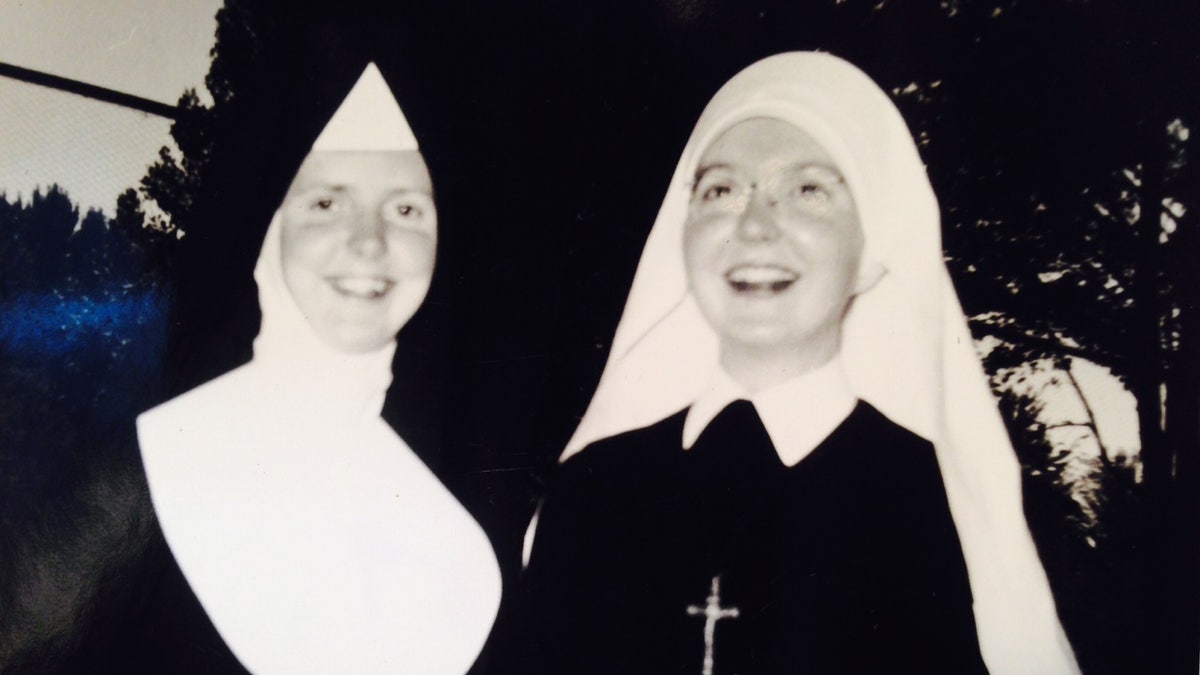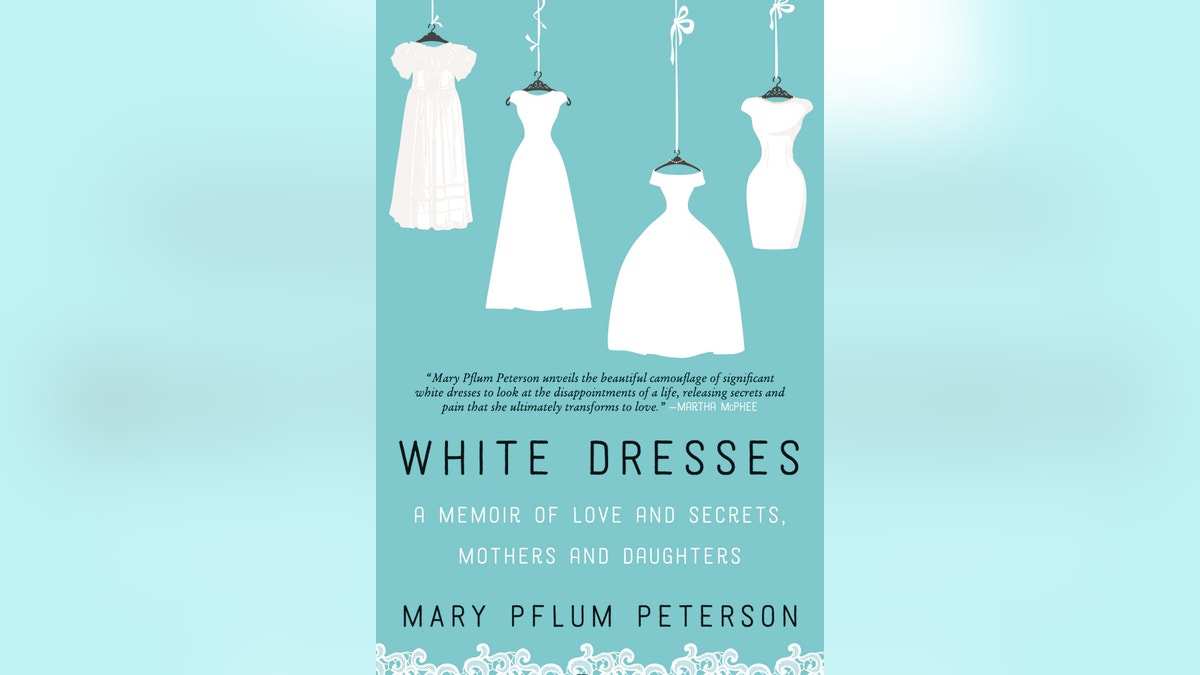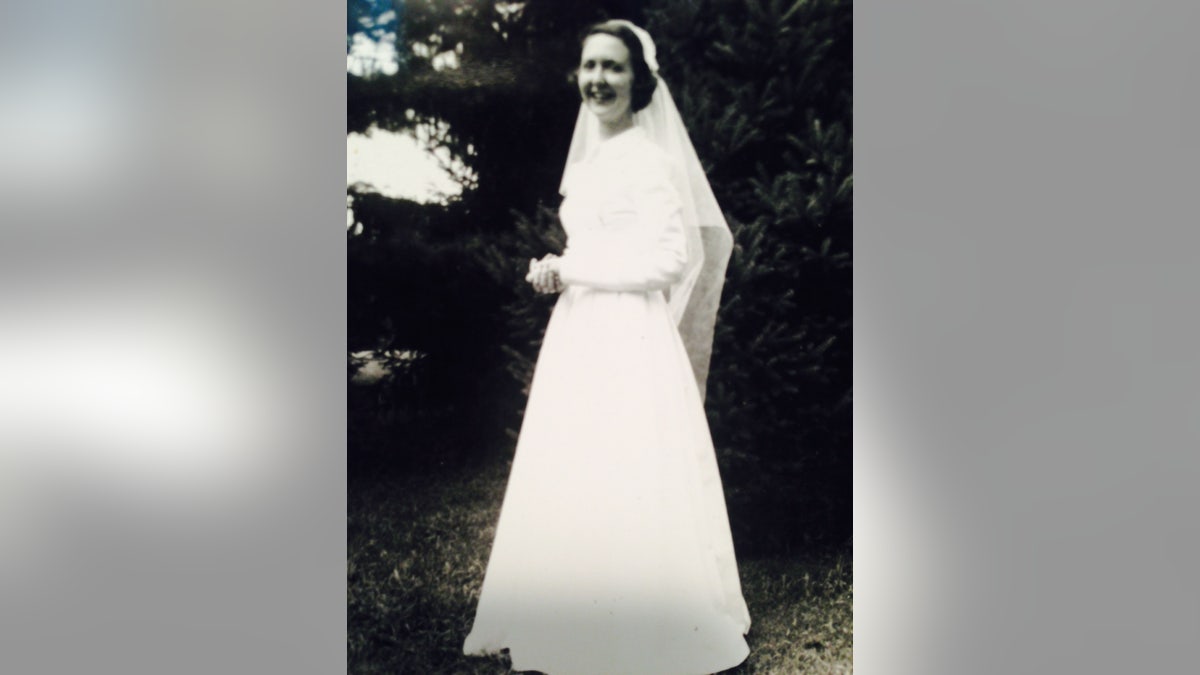
The author's mother Anne Diener Pflum, left, while she was a Catholic nun. (Courtesy of Mary Pflum Peterson)
Like so many young Catholic couples, my husband and I are looking forward to the visit of Pope Francis to the United States. But mixed in with the excitement of taking our four children to see the pontiff during his tour is sadness. Repeatedly, I tell myself, “I wish Mom had lived to see this.”
By “this,” I am referring not only to the arrival of Pope Francis in America and his ascension to the position he holds as leader of the Catholic Church (all 1.2 billion of us), but also to the seismic shift Pope Francis has ushered in. His church is no longer the fire-and-brimstone Catholic Church of the 20thCentury, in which guilt and fear are the prevailing means of tending to a flock. No, the Catholic Church that Pope Francis has placed his indelible thumbprint upon is a new and inclusive church that my mother, the former nun, and my father, the gay man she married without prior knowledge of his sexual leanings, could have only dreamed about. This, at last, is the church for a family like ours – a decidedly imperfect Catholic family.
I first learned of my mother’s time as a sister when I was nine years old. My best friend and I, bored on a rainy day, discovered a bag of old photos in a guest room closet. Among the pictures: images of a young woman wearing an enormous black and white veil.
The Church my mother always dreamed about – forever prayed for – during those daily trips to Mass, has arrived. And for that, as a mother of four little ones, all of whom have been baptized in the church and the oldest of whom are enrolled in Catholic school, I am grateful.
“What’s this?” asked my friend.
I studied the face. The young woman looked familiar.
“I think it’s your mom,” my friend concluded.
Turns out she was right. My mother, Anne Diener Pflum,$ entered the order of the Sisters of St. Francis in the 1957 at the age of 22. She gave up virtually everything when she entered her life of prayer: civilian clothes, prized movie magazines, even her name.

Upon entry, the sisters renamed her Sister Aurelia Mary. A college graduate, my mother thought a life as a nun might enable her to help people around the world, in a manner reminiscent of Mother Teresa. But she was in for a rude awakening when the order she entered didn’t take kindly to independent thinking.
When she and her fellow sisters – many of whom were also college graduates – asked about revamping their order’s local outreach programs to reflect the evolving Cold War world in which they lived, or went so far as to inquire about altering their cumbersome habits -- which were often untenable, particularly in the heat – so that they might be more accessible to the young children they were charged to teach, they were silenced, sometimes punished. Their place as brides of Christ was not to question or to suggest new ways of helping others. No, a nun’s role in the mid-20th century was one of obedience and anonymity. Sisters were to be silent soldiers in the army of a judgmental God.
The Christ my mother had learned about in the Bible counted thieves and prostitutes among his closest friends. But the Church she saw as a sister was intolerant and often, she found, heartless. There was no room for flexibility or compassion. Things were black and white, never grey. Divorce, abortion, single motherhood, homosexuality– these things were absolutely verboten. Church leaders operated above and around the law. Sinners were openly condemned, denied communion, bullied by intolerant clergymen and parishioners who behaved as if the way to Heaven was paved by publicly shaming so-called “sinners.”
After giving her all for eight years, my mother left the convent in 1965. The coming of Vatican II and the growing women’s movement prompted her exit and that of scores more sisters who would leave the convent and work to save the world as laypeople.
But while my mother left her life as a nun, she never left the church. Until her sudden death in December 2010, she made it a mission to attend mass several times a week. Even after her divorce.
My mother married my father in a Catholic mass four years after leaving the convent. She knew something was wrong early in the marriage – but would not learn precisely what until seven years in. My father was gay. He’d sought counsel from a Catholic priest prior to the wedding, who insisted my father wasn’t gay and that marriage was the way to go. Who was my father – or any devout young Catholic man – to question a man of the cloth?
My mother forgave my father. “How could I hate him when he already hated himself so much?” she would later ask me. Besides, she said, Christ would have forgiven my father. She had, too.
My parents divorced. And my mother was thrust into that group of Catholics treated as second class citizens. She'd failed in her marriage - and therefore wasn't considered by many in that fire-and-brimstone era to be as devout as other parishoners. For a time, my mother hung her head in shame - taking my brother and I from the front pew of the church, where we had once sat proudly every Sunday, to a pew in the center, where she worked, as a new divorcee, to blend in with the masses.
“The church isn’t bad,” my mother would continue to insist . “The people who are running it – they’re the ones I have an issue with. They’re the ones that need to open their their hearts. But wait and see. The church will catch up to the will and the needs of the people.”
Under Pope Francis, there have been a myriad of positive signs. He’s embraced women – noting he’s "convinced of the urgency of offering spaces for women in the Church" and that he wants a "more widespread and incisive female presence."

(The author's mother (Courtesy Mary Pflum Peterson))
He has openly displayed his soft spot for divorcees and unwed mothers. Under his leadership, priests, even bishops and cardinals, are being held accountable and dismissed for the horrific sins of badly-bungled-and-appallingly-covered-up priest sex abuse scandals.
That’s not to say Francis has addressed all of the church’s seeming imperfections. Women priests remain an unlikely scenario, even under Francis. And the topic of birth control - which the church has always stood against - is one that he’s not likely to delve into, despite tremendous pressure to do so.
Still, Francis’s church is a far cry from the one my parents grew up in. Thanks to Francis, the church that once proudly excluded has been replaced by an open door policy that cries, 'Come back!' to disillusioned Catholics and 'Come one! Come all!' to the masses, Catholic or not.
The church my mother always dreamed about – forever prayed for – during those daily trips to Mass, has arrived. And for that, as a mother of four little ones, all of whom have been baptized in the church and the oldest of whom are enrolled in Catholic school, I am grateful.
At last this Church recognizes the complexities of family and accepts my family for who we are: decidedly human and unfailingly faithful.
“When it comes to miracles, you’ve gotta be patient,” my mother used to like to tell me.
If only she’d gotten to see the miracle for herself.
